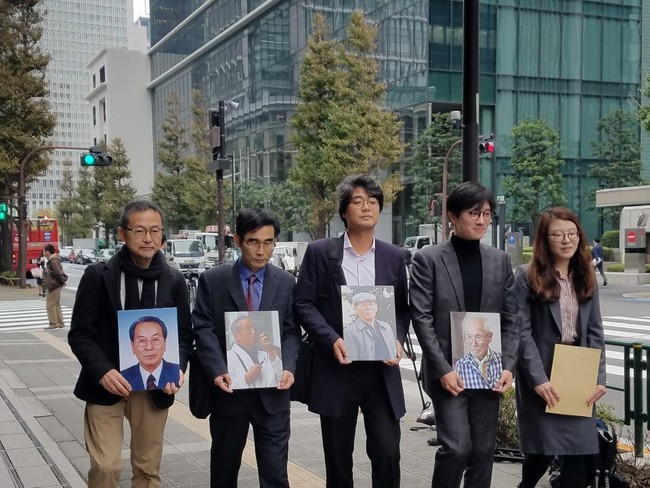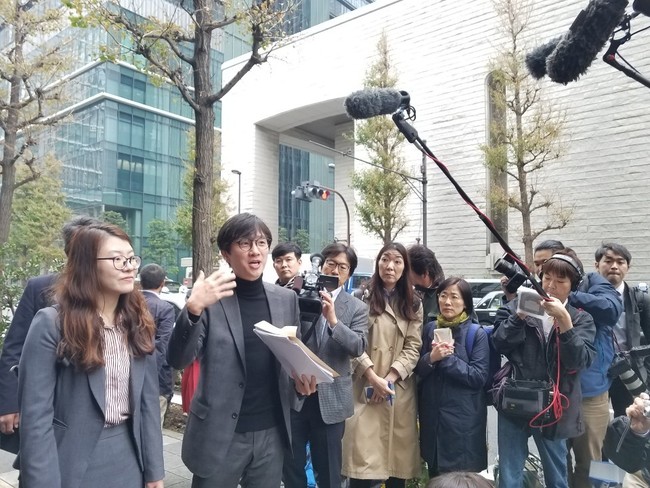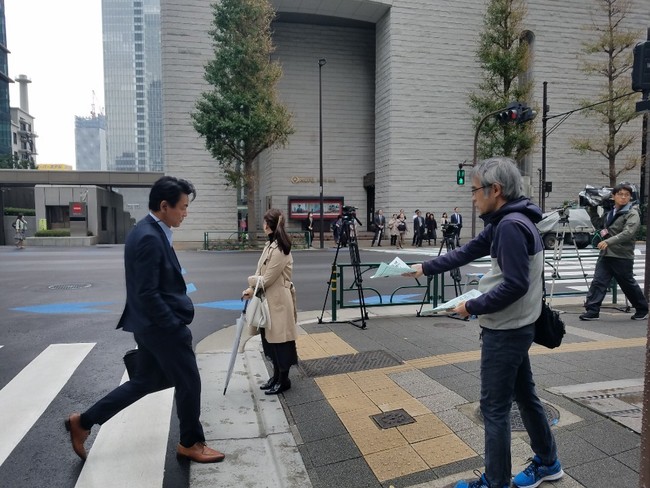Posted on : Nov.13,2018 17:28 KST
Modified on : Nov.13,2018 17:31 KST
 |
|
A group of attorneys and activists from South Korean and Japanese NGOs stand outside Nippon Steel and Sumitomo Metal with photos of forced labor victims on Nov. 12 to protest the company’s refusal to pay reparations to victims of forced labor as dictated by a recent ruling by the South Korean Supreme Court. (all photos by Cho Ki-weon, Tokyo correspondent)
|
Private security hired by Nippon Steel prevent attorneys and activists from entering building
The South Korean attorneys for victims of forced labor were shown little sympathy when they visited the office of Nippon Steel and Sumitomo Metal on Nov. 12 to ask the company to implement a recent ruling by the South Korean Supreme Court.
On Monday morning, the attorneys and activists from South Korean and Japanese NGOs visited the main office of Nippon Steel in Tokyo’s Chiyoda Ward in order to discuss the implementation of the Oct. 30 damages ruling by the Supreme Court. The group entered the office holding the pictures of four victims (three of whom are deceased).
Nippon Steel had a security guard from a private subcontractor inform the group that it refused to meet them. When the attorneys asked a company employee to collect the document outlining their request, the security guard only said he would take their document, without specifying whether or not he would actually deliver it to the company. An interpreter accompanying the group said the security guard’s statement couldn’t be translated into Korean as meaning the document would be delivered.
 |
|
South Korean attorney Lim Jae-seong explains to reporters his reasons for visiting the offices of Nippon Steel and Sumitomo Metal.
|
Attorney Lim Jae-seong spoke with indignance to more than a hundred reporters who had been waiting outside. “We already told the company several times that we were planning to visit. This is cowardly of them,” Lim said.
The document the group had intended to deliver to Nippon Steel said, “The responsibility to pay damages to the victims of compulsory mobilization has been confirmed. Therefore, we would like to deliberate the concrete methods of paying that compensation.”
But Nippon Steel had the security guard read a statement that said, “The South Korean Supreme Court’s ruling is contrary to South Korea and Japan’s [1965] agreement about settling claims and economic cooperation and to the Japanese government’s position. We cannot accept this ruling.”
“Nippon Steel appears to be unwilling to pay compensation. We will take measures to seize [the company’s assets in South Korea]. The available assets include intellectual property such as patents and stock in Nippon Steel’s joint venture with POSCO,” Lim said.
“Further steps will be required to liquidate assets that have been seized. Even after the seizure, Nippon Steel will have time to discuss ways to pay compensation,” said Kim Se-eun, another attorney.
Another member of the group that visited Nippon Steel was Kim Min-cheol, chair of the operating committee of an NGO organized to resolve the issue of compulsory mobilization and to settle historical disputes with Japan.
“There are more than 180 victims [of forced labor at Nippon Steel] and their family members that we’re able to contact, and we’re planning to meet with them to discuss filing additional lawsuits,” Kim Min-cheol said.
 |
|
Activists hand out fliers about Japanese companies’ refusal to pay damages to victims of forced labor conscription outside Nippon Steel and Sumitomo Metal.
|
At 9 am, Japanese activists gathered in front of the entrance to the Nippon Steel office to give passersby printed material urging the company to pay compensation. Japanese activists have been handing out such materials twice a month since 2012, when the South Korean Supreme Court ruled in favor of the plaintiffs in a lawsuit about forced labor and remanded the case to a lower court for review.
During a general meeting of stockholders following the Supreme Court’s ruling six years, Nippon Steel announced that it would accept the final ruling and promised to “abide by the law regardless of the circumstances.”
But after the Supreme Court issued its final ruling last month, the company declared it would be following the Japanese government’s instructions not to pay compensation. “We’ll be taking appropriate measures in line with the government’s response,” the company said.
By Cho Ki-weon, Tokyo correspondent
Please direct comments or questions to [english@hani.co.kr]











